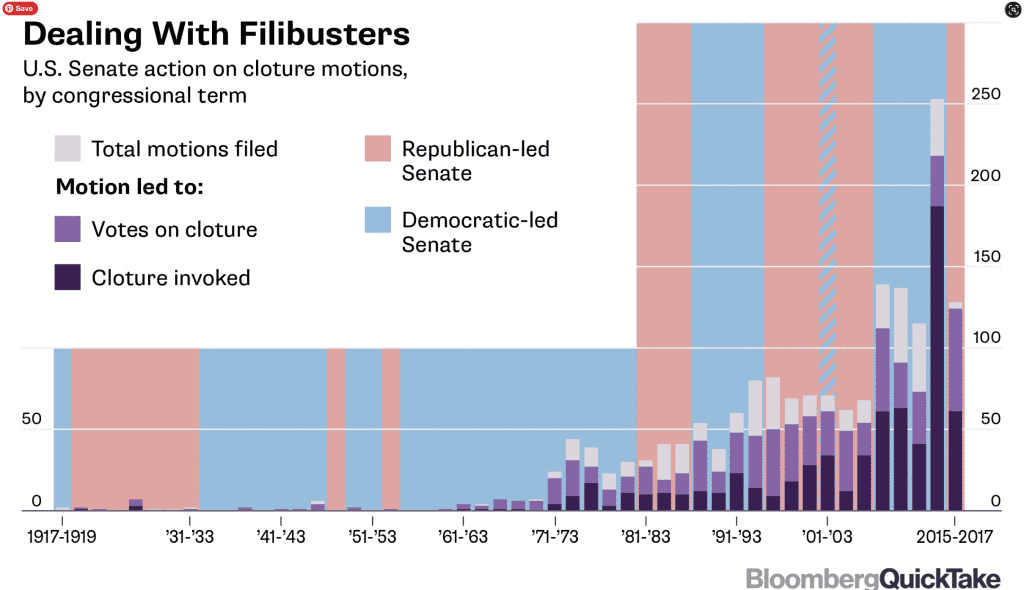Time to Reform the Filibuster?
April 6, 2021

The Senate is again considering changing its rules regarding the filibuster, a parliamentary procedure that gives individual senators the power to shape—and even block—legislation. The filibuster is “a loosely defined term for action designed to prolong debate and delay or prevent a vote on a bill, resolution, amendment, or other debatable question.”1
The filibuster is not in the Constitution; rather, it was an accidental byproduct of a rule change in 1806.2 In 1917, the Senate changed its rules so a filibuster could be ended by a two-thirds majority vote of senators; in 1975, the Senate lowered that threshold to three-fifths.3 Filibusters, or the threat of a filibuster, used to be rare. These days, the minority party uses the filibuster as a matter of routine, essentially creating a 60-vote threshold for most bills to pass.
Today, many Senate Democrats are considering removing the filibuster altogether, meaning that any legislation would require a simple majority vote to pass the Senate. It is not guaranteed that Democrats would be able to do this, as at least two members of their party, Senators Kyrsten Sinema, D-Ariz.,4 and Joe Manchin, D-W.V., have not endorsed filibuster reform. Almost all Senate Democrats support another position, allowing for a “talking filibuster” in which a member could hold the floor in order to delay or block a vote. Under this proposal, individual senators would have a path to make their voices heard, but not all legislation would require 60 votes to pass the Senate.
WATCH: The history of, and debate about, the filibuster, from the Washington Post
Arguments for Keeping the Filibuster
Those who want to keep the filibuster argue that this procedure empowers each individual senator to have a voice on all legislation, meaning that every state, no matter how small and no matter the party affiliation of its senators, has a say in policymaking.6 In an argument against ending the filibuster, former Senator Mike Enzi, R-Wyo., wrote that the filibuster can do as much to ensure compromise as it does to create division. He pointed out that, because of the threat of the filibuster, he and Senator Ted Kennedy, D-Mass., were able to work together to produce 38 bipartisan bills in 2005 and 2006 alone.7 Supporters of the filibuster also note that the Senate is intended to be a deliberative body that cools the passions of the House of Representatives.8 In other words, the House majority is able to act quickly—sometimes too quickly—and it is up to the Senate to weigh all matters carefully and deliberately and to build a 60-vote consensus.
Arguments for Ending the Filibuster
Advocates of ending the filibuster argue that this procedure was never intended to be commonplace, and that it was only a clerical error that allowed it to exist at all.9 Critics note that the filibuster was a rarely used tool until recent years, and that its use exploded during the administration of President Barack Obama. As such, they argue that the founders never intended the Senate to be so gridlocked.10 Some proponents of ending the filibuster argue that it has been a tool of racism and white supremacy, with Princeton historian Kevin Kruse saying “it’s been a tool used overwhelmingly by racists” to protect slavery and Jim Crow segregation.11
Discussion Questions
- What do you think are the strongest arguments for keeping the filibuster? What are the strongest arguments for getting rid of it?
- Do you support keeping the filibuster? Why or why not?
- How would you urge your senators to vote on this matter?
Further Reading and Resources
-
- The Heritage Foundation: “The Filibuster Protects the Rights of All Senators and the American People”
- Watch: Senator Mike Lee, R-Utah, makes the case to keep the filibuster in a Federalist Society policy brief
- Wall Street Journal: Senate Minority Leader Mitch McConnell, R-Ky., argues that ending the filibuster would create a “scorched-earth Senate”
- Watch: Senator Elizabeth Warren, D-Mass., argues for ending the filibuster
- Rashad Robinson writes in USA Today and Zach Beauchamp writes on Vox.com about the filibuster and race
- Politico: “‘They Are, in Effect, Supporting Racism’: Black Leaders Zero in on Dems’ Filibuster Holdouts”
- Rolling Stone: “The Filibuster’s Ugly History and Why It Must Be Scrapped”
- #CloseUpConversations: Join Close Up on Thursday, April 8, at 6 pm EST for a conversation with Adam Jentleson, the author of Kill Switch: The Rise of the Modern Senate and the Crippling of American Democracy, to discuss what the filibuster is, how it works, and what reform would mean. Jentleson is a frequent political commentator on MSNBC and a guest on numerous podcasts, including NPR’s “Fresh Air,” “The Ezra Klein Show,” and “Why Is This Happening with Chris Hayes.”
As always, we encourage you to join the discussion with your comments or questions below!
Sources
Featured Image Credit: RWT/AP
[1]. Senate.gov: https://www.senate.gov/about/powers-procedures/filibusters-cloture.htm
[2] USA Today: https://www.usatoday.com/videos/news/justthefaqs/2021/03/08/filibuster-what-how-could-affect-bidens-agenda-senate/4626598001/
[3] Senate.gov: https://www.senate.gov/about/powers-procedures/filibusters-cloture.htm
[4] National Review: https://www.nationalreview.com/news/sinema-calls-on-senators-to-change-their-behavior-instead-of-eliminating-filibuster/
[5] Vox.com: https://www.vox.com/2021/3/20/22341271/feinstein-filibuster-reform-talking-joe-manchin-kyrsten-sinema-joe-biden-senate-60-votes
[6] Politico: https://www.politico.com/story/2011/01/against-ending-the-filibuster-048019
[7] Ibid.
[8] The Heritage Foundation: https://www.heritage.org/political-process/report/the-filibuster-protects-the-rights-all-senators-and-the-american-people
[9] USA Today: https://www.usatoday.com/videos/news/justthefaqs/2021/03/08/filibuster-what-how-could-affect-bidens-agenda-senate/4626598001/
[10] Brennan Center for Justice: https://www.brennancenter.org/our-work/research-reports/case-against-filibuster
[11] Vox.com: https://www.vox.com/policy-and-politics/2021/3/25/22348308/filibuster-racism-jim-crow-mitch-mcconnell







